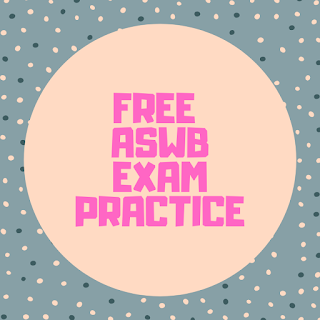Here's a new set of practice questions from the SWTP blog. Each follows an explainer about the covered topic--all drawn from the ASWB content outline.
A social worker is working with a family affected by domestic violence. The youngest child in the family is exhibiting aggressive behavior at school, withdrawing from peers, and struggling academically. Which of the following is the MOST likely explanation for the child’s behavior?
A. The child has developed a personality disorder as a result of the domestic violence.
B. The child has been spoiled and is acting out to get attention.
C. The child is mirroring behaviors observed at home and responding to trauma.
D. The child’s behavior is likely unrelated to the domestic violence.
Read up and get the answer here.
A social worker meets with a middle-aged client who is dependent on their partner for housing and financial support. The client reports being forced to perform unpaid labor and being isolated from friends and family. The social worker suspects labor exploitation. What should the social worker do FIRST?
A. Encourage the client to leave the relationship immediately.
B. Refer the client to vocational training programs to gain independence.
C. Work with the client to develop a safety plan and explore support options.
D. Report the partner to law enforcement for labor trafficking.
Read up and get the answer here.
A client expresses guilt for feeling relief after their parent’s death, as the parent had suffered from a long-term illness. What should the social worker explore first?
A. The client’s relationship with their parent before the illness.
B. The cultural beliefs and values influencing the client’s grief.
C. Whether the client has resolved their grief.
D. The presence of depressive symptoms due to unresolved grief.
Read up and get the answer here.
A social worker is assisting a client who has recently been diagnosed with a chronic illness and needs help accessing medical care, housing assistance, and transportation services. Which service delivery method is MOST appropriate in this situation?
A. Individual Therapy
B. Therapeutic Group
C. Social Action
D. Case Management
Read up and get the answer here.
During a session, a client becomes increasingly angry and begins shouting. What is the most appropriate action for the social worker to take?
A. Allow the client to vent their anger fully before intervening.
B. Calmly redirect the client to focus on the goals of the session.
C. End the session immediately to de-escalate the situation.
D. Match the client’s tone to show empathy and understanding.
Read up and get the answer here.
One you're at SWTP, consider staying for the full-length practice tests. Sitting for full-length practice really gets you ready to pass the ASWB exam. : )








